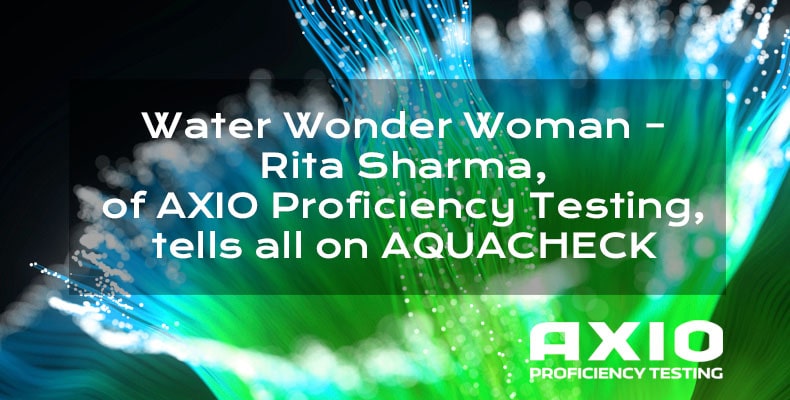
Rita Sharma is Technical Manager in Chemistry for LGC AXIO Proficiency Testing. A trained pharmacologist and biochemist, she is primarily responsible for AQUACHECK - one of the longest running, and most popular AXIO schemes. She also looks after the CONTEST scheme (Contaminated Land) and the AIR PT scheme (Air and Stack Emissions).
Rita Sharma is a new breed of trouble shooter – one who solves laboratories’ analytical problems for a living, and is totally devoted to her craft. Since moving into management, she no longer has the opportunity to take apart and fix her own favourite instruments - which she refers to as her ‘babies’ - herself. Instead, she lends her passion for instrumentation, meticulous measurement and problem-solving to the thousands of laboratories taking part in AXIO Water and Environment schemes.
What purpose does proficiency testing serve in the water sector?
Regulation wise, we help our enrolled laboratories stick to the approved ranges for all the potentially dangerous elements, compounds, and organic compounds which you'll find in water. The regulations are always changing, as well, so we help our customers to remain compliant.
It’s just good to control what we’re putting into the environment. For example, you don't want too high lead and zinc – especially lead - in water and seawater. It can be hazardous to humans, and you’ve also got to think of the consequences for fish, animals and the environment too. They also have an effect on us through the food chain, so we need to be sure we’re not poisoning ourselves.
How has AQUAQUECK evolved into your largest scheme?
It started off in 1985, mainly in the UK – and back then it was mostly to do with UK laboratories following UKAS water chemistry requirements. But it's worldwide now. A lot of European countries purchase AQUACHECK because it fits in nicely with what they want. Other countries, such as India, may want additional analytes in order to comply with local regulations. It’s such a robust scheme that we’ve got more than 7,000 laboratories enrolled now – even in countries like China and Australia. So it's huge. There are so many participants, and because we’re so established, it’s growing all the time.
What analytes and matrices does it cover?
In AQUACHECK, we cover everything - from ecotoxicology in surface water, to oils in the sea and nutrients in mineral water. We’ve got so many different types - even swimming pool water – and we try and keep our matrices as natural as possible. We used to have a lot of artificial ways of making the waters and, over the years, we've concluded that the natural way is probably the best way. And, from our experience, accreditation bodies are on board with that as well: they prefer to see real life matrices.
What kind of laboratories or organisations does AQUACHECK support?
Because it guarantees the safety of your drinking water and the wider environment as well, there are some very big labs taking part. Water companies, governments, and councils are enrolled in AQUACHECK. We also help bottled water firms. All across the world, you'll get different types of water, but soft is ideal for them because it’s more potable.
What are the challenges of managing the AQUACHECK scheme?
The number of checks that we do here to get the scheme just right is absolutely astonishing: the paperwork checks, the sample checks, the presentation of the sample. There’s so much key detail that you present to a customer. And our reputation is all about quality, so it's got to be high end quality that we're delivering as well.
What’s going to be the next big development in water testing?
We believe Microplastics is going to be a big thing, and the authorities are creating a regulation suitable for us to test the levels of microplastics in river water at the moment. So, eventually AQUACHECK will be offering something for microplastics - we'll see a sample in place in a few years’ time - but it's still in its early stages.
How does participating in AXIO schemes help laboratories ensure quality and compliance?
We're trying to help them maintain their quality as labs, and fulfil the requirements for laboratory accreditation at the same time. So if they do have a questionable result, we advise them to investigate the reason behind it – and it could be anything. It could be the analyst, or a change of instrument. They may need to buy a new sample, or a repeat sample. Maybe the sample they've got has become contaminated, somehow, or the storage conditions aren't good?
When you have an ongoing problem, like a negative bias in all your reported results for a specific parameter, we’d also advise you to investigate why. Because you should always be getting something like a rollercoaster pattern on your quality control charts – which will be within your upper and lower control limits. But if you've got a negative bias, so it's always on the low side, this would be flagged as a lower warning and there is something potentially wrong with your analytical system. If the accreditation body audits that lab, they may say: ‘Hold on. Why have you not done any investigation? Because there's clearly something that's gone wrong here.’ There are often a number of factors involved, and we as technical advisors are there to help laboratories find a reason behind what could have gone wrong - and when they find it, they are usually pretty happy!
To discover more about AQUACHECK and other AXIO Proficiency Testing Water & Environment schemes please visit www.lgcstandards.com/AXIO
